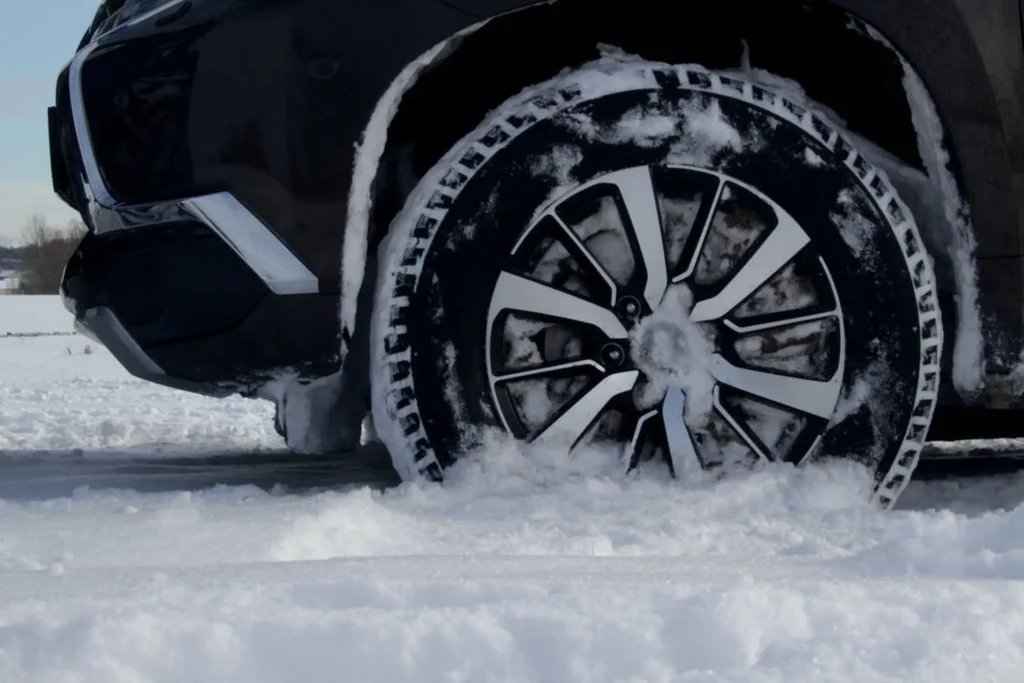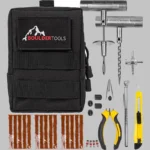Winter driving can be a real adventure, can’t it? There’s nothing quite like navigating through a fresh snowfall or gliding across a patch of black ice to get your heart racing. But as thrilling as it can be, winter driving comes with its own set of challenges, and choosing the right tires is a big part of meeting those challenges head-on.
In this article, we’re going to discuss the nitty-gritty of snow and winter tires to help you make an informed decision that could make your winter drives safer and more enjoyable.
What Are Snow and Winter Tires?

First things first, let’s get clear on what we’re talking about. Snow and winter tires are specially designed to perform better than regular all-season tires in cold, snowy, and icy conditions. Unlike all-season tires, which aim to be a jack-of-all-trades, winter tires are the specialists. They come with features like unique rubber compounds that stay flexible in freezing temperatures, deeper tread depths, and biting edges designed to grip snow and ice.
Pros of Snow and Winter Tires
- Enhanced Traction
You know that feeling when your car’s tires just can’t seem to find their grip on a slick road? Winter tires tackle that problem head-on. Their specialized rubber compounds and unique tread designs provide far better traction in snow and on ice than all-season tires. Last winter, I swapped out my all-season tires for a set of winter ones, and the difference was night and day. No more sliding at stop signs!
- Improved Braking Performance
Stopping on icy roads is one of the biggest challenges of winter driving. Winter tires significantly reduce stopping distances because they’re designed to maintain flexibility in cold weather. This means the tire can better conform to the road surface and grip it, allowing for more effective braking. Studies have shown that vehicles equipped with winter tires can stop up to 30% quicker on ice compared to those with all-season tires.
- Better Handling and Stability
Winter tires come with tread patterns designed to channel snow and slush away from the tire. This helps maintain better contact with the road, giving you greater control over your vehicle. I remember driving through a particularly nasty snowstorm last January and feeling confident in my car’s stability, thanks to those aggressive treads cutting through the snow.
- Safety Benefits
At the end of the day, it all boils down to safety. Winter tires can reduce the risk of accidents in harsh winter conditions. Personal stories from friends and family often highlight the life-saving benefits of having the right tires. For example, my cousin avoided a potentially serious collision last winter thanks to the enhanced performance of his snow tires.
Cons of Snow and Winter Tires
- Increased Cost
There’s no denying it – winter tires can be expensive. You’re looking at the cost of the tires themselves, plus the cost of switching them out twice a year. And if you don’t have a second set of wheels, you’ll need to pay for mounting and balancing each season. However, when you weigh this against the potential cost of an accident, it might seem like money well spent.
- Faster Wear on Dry Pavement
Winter tires are made from softer rubber compounds that wear out more quickly on dry, warm pavement. If you leave your winter tires on through the summer, you’ll find yourself needing to replace them sooner than expected. The key is to switch them out once the temperatures start rising consistently above freezing.
- Storage and Maintenance
One of the less talked about aspects of winter tires is where to put them when you’re not using them. They’re bulky, and not everyone has the space to store an extra set of tires. Plus, they need to be stored properly to ensure they don’t deteriorate. If you’ve got a small garage or limited storage space, this can be a bit of a headache.
- Noise and Comfort
Winter tires can be noisier than all-season tires, and the ride might feel a bit rougher. The aggressive tread patterns that provide such great traction can also produce more road noise. It’s a small price to pay for safety, but it’s something to be aware of if you value a quiet, smooth ride.
Snow Tires vs. All-Season Tires: Which to Choose?
Making the right tire choice isn’t always straightforward. Here’s a quick rundown to help you decide.
- Climate Considerations If you live in a place where winter means snow, ice, and freezing temperatures, winter tires are a no-brainer. But if your winters are mild and you only occasionally see snow, you might get by with a good set of all-season tires.
- Driving Habits Think about how and where you drive. Do you have a long commute through rural areas that don’t get plowed as quickly? Winter tires are likely worth the investment. On the other hand, if you mainly drive in a city where roads are cleared quickly, all-season tires might suffice.
- Cost-Benefit Analysis Winter tires can save you money in the long run by preventing accidents and wear and tear on your vehicle. Plus, they can extend the life of your summer tires since you’re not using them year-round. It’s an investment in safety and longevity.
Key Features of Snow and Winter Tires
- Tread Rubber The rubber used in winter tires stays softer and more pliable at low temperatures, which helps with grip. Regular tires harden in the cold, reducing their effectiveness.
- Tread Depth and Patterns Winter tires have deeper treads and more complex patterns. These features help channel slush and snow away from the tire, maintaining better contact with the road.
- Biting Edges These are small slits in the tread that provide extra biting edges for better grip on ice. Imagine a cat’s claws digging into a surface – that’s what these edges do for your tires.
- Special Compounds Some winter tires use high-tech compounds that improve grip. For example, Bridgestone’s Blizzak tires have a multi-cell compound designed to wick away the thin layer of water that forms on ice, providing better traction.
Personal Recommendations
From my own experience and the feedback I’ve gathered from fellow drivers, here are a few winter tires that have consistently performed well:
- Bridgestone Blizzak WS90 Known for excellent ice and snow traction.
- Michelin X-Ice Xi3 Great for extreme winter conditions, offering superb grip and long-lasting performance.
- Nokian Hakkapeliitta R3 A favorite among those who face the harshest winter weather.
Conclusion
Choosing the right tires for winter driving isn’t just a matter of preference; it’s a crucial safety decision. Winter tires offer significant advantages in terms of traction, braking, and handling. Yes, they come with higher costs and some inconveniences, but the peace of mind they provide is priceless. So, as the first snowflakes begin to fall, make sure your vehicle is equipped to handle whatever winter throws your way.
FAQs
- Do I need winter tires if I have an all-wheel drive? Yes, because winter tires provide better traction on snow and ice, regardless of your vehicle’s drive system.
- How long do winter tires last? On average, they can last 3-4 seasons, depending on usage and how well they are maintained.
- Can I use winter tires year-round? It’s not recommended. Winter tires wear out faster on warm, dry roads and don’t perform as well as summer tires in those conditions.

Matthew Dowell
Matthew, a seasoned builder from a family of craftsmen, leads Tools Trove. His passion for tools and decades of hands-on experience fuel his commitment to providing expert reviews and insightful content. Whether you’re a pro or a DIY enthusiast, Matthew’s guidance ensures informed decisions in the world of tools.




